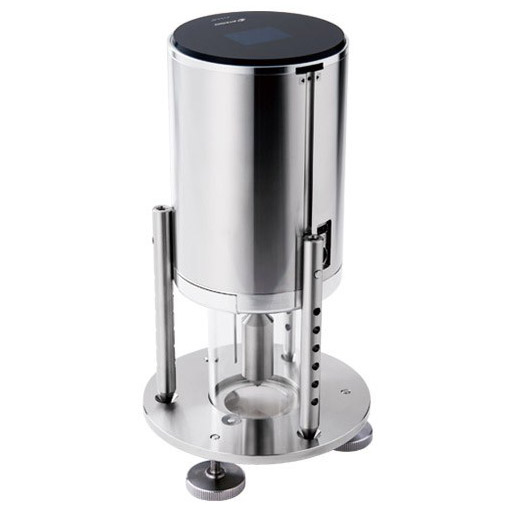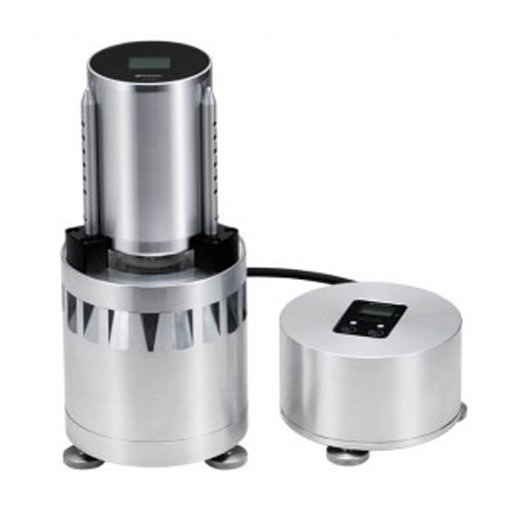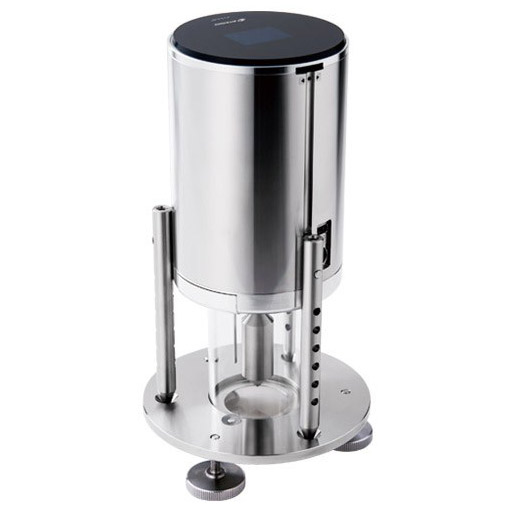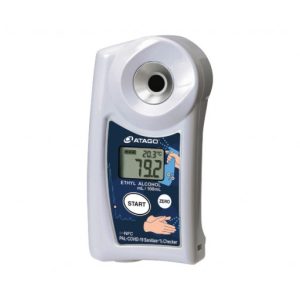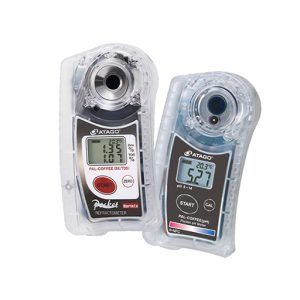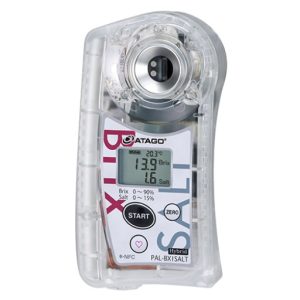The Digital Viscometer Visco is very easy to set up. The spindle can be attached with just “one-touch” — simply insert the spindle in the instrument. Absolutely no complicated set-up required.
Measurement preparation can easily be done with just one hand. Place the beaker underneath the pre-set area and place the instrument on the stand. No troublesome height adjustment is necessary. Operation requires only one dial button. All operations can be performed with the simple act of “sliding” or “pushing” the dial button. No more accidental operations due to pushing the wrong button.
Applications for VISCO™
- Miso
- Beverages
- Rice Porridge
- Batter
- Shampoo
- Conditioner
- Hand cream
- Toothpaste
- Yogurt
- Ice cream
- Bean paste
- Sauce
- Curry
- Tomato ketchup
- Butter
- Chocolate
- Paint
- Cleaning solution
- Engine oil
- Thickener
Other Applications
- Condiment
- Olive oil
- Honey and jam
- Fried egg
- Jelly and agar
- Cosmetics
- Adhesive
- Water glass
- Resin, Polymer
- Insulator
- Glycerin
- Lubricant
- Slurry
Digital Viscometer Visco
What is a Viscometer?

There are different types of viscometers that use various measurement methods.
For example, in the Japanese Industrial Standard JIS Z 8803, viscometers are classified as follow:
• Capillary viscometers • Falling ball viscometers
• Rotational viscometers • Vibrational viscometers
There are also other measurement methods such as viscosity cups and Line Spread Tests (LST).
ATAGO’s viscosity meter VISCO™ is measured on a principle called rotational viscosity.
Principle of Rotational Viscometer
Rotational viscometer is one of the most common viscometers used. The structure is simple, easy to use, and the measurement range is wide and can be measured with high accuracy.
When a cylindrical spindle is placed in the sample and rotated at a constant speed, the viscosity is determined by measuring the torque (shear stress) acting on the cylindrical surface.
There are different types of spindles: coaxial double cylinder, single cylindrical, and cone, and plate. The cone plate type can determine the flow characteristics of non-Newtonian fluids by changing the rotational speed.

Function and Design

Why VISCO™
Easy Operation
The assembly takes 30 seconds. It frees you from the hassle of preparation, cleaning up, and removes hesitation for measurements. Only one button to deal with. From setting up to measurements, you can do it with one hand.

Small Sample Volume
The amount of sample required for measurement is only 15 mL or 100 mL. The time to wash the beaker is greatly reduced, too.
Disposable Containers
VISCO™ can measure using paper cups or plastic cups. It’s disposable and does not require you to wash the beakers. It is safe even in areas where glassware is restricted.

Battery Powered
VISCO™ is powered by AC power supplies or batteries. The battery life is about seven hours. Easy measurements, any place and in any situation.
Lab to the Production Site
ATAGO’s viscosity meter VISCO™ is very lightweight and compact with a height of 20 cm and a weight of 895 g. Easy to carry from the lab to the production site.

Incredible Cost Performance
The price of VISCO™ is less than half the price of a B-type viscometer. ATAGO provides high-value, high-quality products at the right price for customers to experience it first-hand and use it a lot.
Good with Low Viscosity
Low viscosity samples can be measured with VISCO™. ATAGO’s VISCO™ has an adapter for low viscosity samples.

Calibration and Standard Solution
Calibration compares the true value and the value measured from the instrument. Calibration is an important task to ensure the reliability of the measurement results. Calibration is recommended when the measurement environment has changed drastically or when the measurement results are out of the norm. If you are considering routine calibration, we recommend that you decide the frequency based on the circumstance in which the instrument is used and past measurement results. ATAGO’s viscometer VISCO™ provides the following standard solutions:
The standard solutions are available in various viscosity. It is recommended to calibrate with a standard solution that is close to the viscosity of samples being measured.
Part number Part name Contents
RE-89030 Viscosity Standard Liquid 2 100mL
RE-89031 Viscosity Standard Liquid 5 100mL
RE-89036 Viscosity Standard Liquid 200 100mL
RE-89037 Viscosity Standard Liquid 500 100mL
RE-89038 Viscosity Standard Liquid 1000 100mL
RE-89039 Viscosity Standard Liquid 2000 100mL
The Digital Viscometer Visco is very easy to set up. The spindle can be attached with just “one-touch” — simply insert the spindle in the instrument. Absolutely no complicated set-up required.
Measurement preparation can easily be done with just one hand. Place the beaker underneath the pre-set area and place the instrument on the stand. No troublesome height adjustment is necessary. Operation requires only one dial button. All operations can be performed with the simple act of “sliding” or “pushing” the dial button. No more accidental operations due to pushing the wrong button.
Applications for VISCO™
- Miso
- Beverages
- Rice Porridge
- Batter
- Shampoo
- Conditioner
- Hand cream
- Toothpaste
- Yogurt
- Ice cream
- Bean paste
- Sauce
- Curry
- Tomato ketchup
- Butter
- Chocolate
- Paint
- Cleaning solution
- Engine oil
- Thickener
Other Applications
- Condiment
- Olive oil
- Honey and jam
- Fried egg
- Jelly and agar
- Cosmetics
- Adhesive
- Water glass
- Resin, Polymer
- Insulator
- Glycerin
- Lubricant
- Slurry
Digital Viscometer Visco
What is a Viscometer?

There are different types of viscometers that use various measurement methods.
For example, in the Japanese Industrial Standard JIS Z 8803, viscometers are classified as follow:
• Capillary viscometers • Falling ball viscometers
• Rotational viscometers • Vibrational viscometers
There are also other measurement methods such as viscosity cups and Line Spread Tests (LST).
ATAGO’s viscosity meter VISCO™ is measured on a principle called rotational viscosity.
Principle of Rotational Viscometer
Rotational viscometer is one of the most common viscometers used. The structure is simple, easy to use, and the measurement range is wide and can be measured with high accuracy.
When a cylindrical spindle is placed in the sample and rotated at a constant speed, the viscosity is determined by measuring the torque (shear stress) acting on the cylindrical surface.
There are different types of spindles: coaxial double cylinder, single cylindrical, and cone, and plate. The cone plate type can determine the flow characteristics of non-Newtonian fluids by changing the rotational speed.

Function and Design

Why VISCO™
Easy Operation
The assembly takes 30 seconds. It frees you from the hassle of preparation, cleaning up, and removes hesitation for measurements. Only one button to deal with. From setting up to measurements, you can do it with one hand.

Small Sample Volume
The amount of sample required for measurement is only 15 mL or 100 mL. The time to wash the beaker is greatly reduced, too.
Disposable Containers
VISCO™ can measure using paper cups or plastic cups. It’s disposable and does not require you to wash the beakers. It is safe even in areas where glassware is restricted.

Battery Powered
VISCO™ is powered by AC power supplies or batteries. The battery life is about seven hours. Easy measurements, any place and in any situation.
Lab to the Production Site
ATAGO’s viscosity meter VISCO™ is very lightweight and compact with a height of 20 cm and a weight of 895 g. Easy to carry from the lab to the production site.

Incredible Cost Performance
The price of VISCO™ is less than half the price of a B-type viscometer. ATAGO provides high-value, high-quality products at the right price for customers to experience it first-hand and use it a lot.
Good with Low Viscosity
Low viscosity samples can be measured with VISCO™. ATAGO’s VISCO™ has an adapter for low viscosity samples.

Calibration and Standard Solution
Calibration compares the true value and the value measured from the instrument. Calibration is an important task to ensure the reliability of the measurement results. Calibration is recommended when the measurement environment has changed drastically or when the measurement results are out of the norm. If you are considering routine calibration, we recommend that you decide the frequency based on the circumstance in which the instrument is used and past measurement results. ATAGO’s viscometer VISCO™ provides the following standard solutions:
The standard solutions are available in various viscosity. It is recommended to calibrate with a standard solution that is close to the viscosity of samples being measured.
Part number Part name Contents
RE-89030 Viscosity Standard Liquid 2 100mL
RE-89031 Viscosity Standard Liquid 5 100mL
RE-89036 Viscosity Standard Liquid 200 100mL
RE-89037 Viscosity Standard Liquid 500 100mL
RE-89038 Viscosity Standard Liquid 1000 100mL
RE-89039 Viscosity Standard Liquid 2000 100mL






